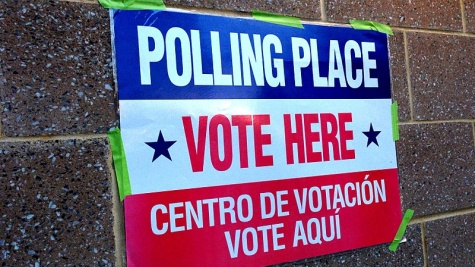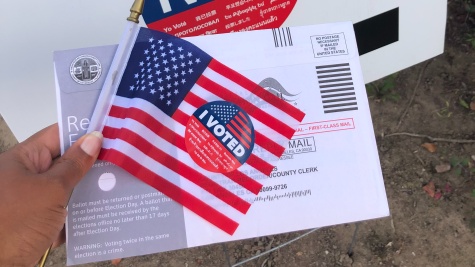Information and Identification: A Field Experiment on Virginia’s Photo Identification Requirements
The MIT Election Data and Science Lab helps highlight new research and interesting ideas in election science, and is a proud co-sponsor of the Election Sciences, Reform, & Administration Conference (ESRA).
Kyle Endres and Costas Panagopoulos recently presented a paper at the 2018 ESRA conference entitled, “Information and Identification: A Field Experiment on Virginia’s Photo Identification Requirements.” Here, they summarize their analysis from that paper.
Our recent paper discusses a randomized field experiment we designed to assess the effects of providing informational reminders about voter ID requirements to registered voters in Virginia’s general election in November, 2017.
We examine the effects of our interventions on voter turnout in the election unobtrusively, using validated voting records obtained following the election, but we also consider whether our treatments influenced attitudes about voter ID laws, perceptions of electoral fraud, and other aspects of elections by contacting subjects after the election to solicit their views on these topics in a short-automated telephone survey.
Each of the subjects in our study was randomly assigned to one of three treatment groups or to a control condition using block randomization based on age group, gender, 2013 election turnout, and 2016 turnout. Subjects in the treatment groups were mailed an informational postcard prior to the election. No postcards were mailed to the control group. As was the case with some previous experimental examinations of voter ID requirements, we partnered with the League of Women Voters (LWV) to design these postcards. The cards included elements that were comparable to one of these studies, including the LWV logo, return address, and an American flag background.
The contents of the informational messages emblazoned on the postcards, however, differed in some key respects from previous studies. We randomly varied the messages with associated informational cues to reflect three broad themes. Individuals who were randomly assigned to the first treatment group were mailed an “informational” postcard that reminded subjects of the upcoming election, encouraged them to vote, provided basic details about the photo ID requirement, and listed acceptable forms of identification.
Our second treatment group received postcards that featured a message designed to emphasize voters’ rights; these postcards featured the same text as the informational message, but also included a blandishment to “know your rights” in bold. These cards provided additional details about casting provisional ballots if necessary.
A third treatment group included all of the information featured in the “know your rights” version, and added a warning to the voter that they should not be “turned away” at the polls. These postcards also included a justification noting that voter ID laws are occasionally improperly implemented, effectively denying citizens their voting rights. The exact wording of these cards was:
Don’t be turned away: Many voters are not aware that they are required to show ID at the polls, and some studies show voter ID requirements disproportionately affect women, young people, the elderly, and communities of color. In the November 2014 election in Virginia, 474 people cast provisional ballots because they didn’t have proper photo ID. Unfortunately, voter ID laws are not always implemented properly, and many voters risk being turned away and denied their voting rights!
We examine the effects of our treatments using two key outcome measures. First, we obtained official voter turnout records for the November 2017 elections following the election. We also conducted a post-election survey, which was relatively brief; it contained between 13 and 15 questions depending on responses provided. The survey probed respondents about perceptions of fraud, satisfaction with democracy, and self-assessed and actual knowledge of Virginia voting requirements.
Our results suggest the information mailers we deployed exerted negligible effects on turnout, overall, in the 2017 Virginia election. However, we do observe some heterogeneity in the effects of our interventions. The postcard mailer that explicitly mentioned the possibility that the state’s photo identification laws could disproportionately affect demographic groups which generally support the Democratic party in large numbers is an exception, increasing turnout significantly among Democrats.
This finding is consistent with arguments advanced in Valentino and Neuner (2017) that Democrats have an emotional response (anger) to electoral reforms they perceive as targeting their copartisans, and in turn express intentions to participate at higher rates. In fact, we find the “don’t be turned away” message exerted the strongest effects among black Democrats. The estimated effect of this version of the postcard was a 2.40 percentage point (p=.054, two-tailed) increase in turnout for white Democrats and 3.43 percentage point (p=.048, two-tailed) increase for black Democrats. This postcard mailer does not appear to have had much of an effect on the turnout of Latinx registered voters, though our sample size is much smaller for this subgroup. The “don’t be turned away” treatment also seems to have had a negative, though statically insignificant, effect on Republican turnout.
The information campaign also influenced subjects’ views of the prevalence of voter fraud in the 2017 Virginia election. Our experimental findings appear to show that informing registered Virginia voters that state law now requires all individuals to show a valid photo identification decreased perceptions of fraud overall. This reduction in the perceived prevalence of voter fraud is largely driven by responses from Republican registered voters, who were significantly less likely to report that “many fraudulent votes” were cast; to a lesser extent, perceptions of fraud among Democratic voters increased.


